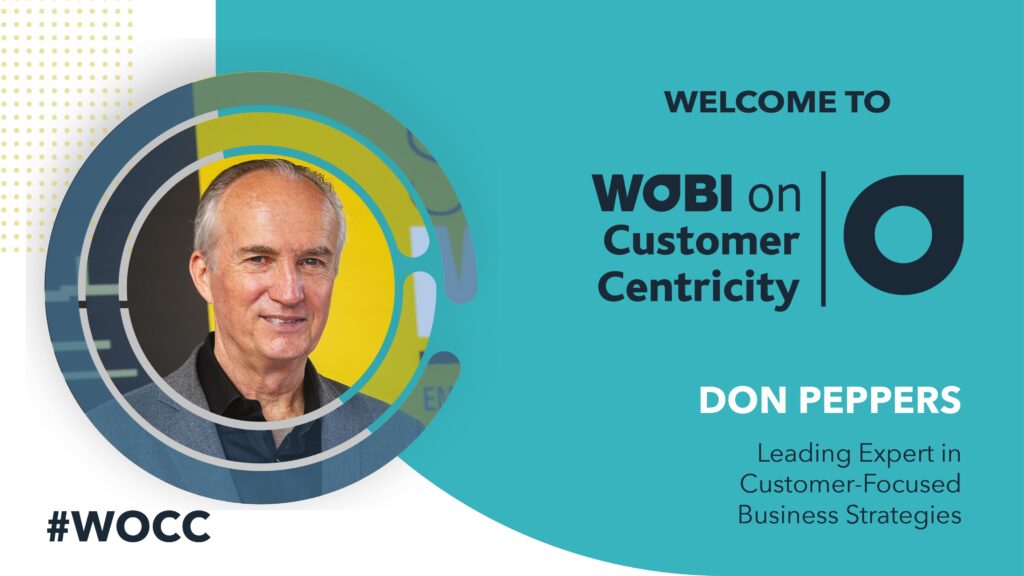Join Don Peppers for the WOBI on Customer Centricity seminar, September 29.
As Don Peppers prepares for the WOBI on Customer Centricity seminar on 29 – 30 September & 1 October 2020, he shared with CEO North America his thoughts on this defining moment for leaders as they reset the workforce, the value of employing rules and algorithms, as well as the tools needed to navigate the paradigm-shifting threat represented by this pandemic.
90% of executives around the world have said in a June 2020 McKinsey survey they expect the fallout from COVID-19 to fundamentally change the way they do business over the next five years, with almost as many asserting that the crisis will have a lasting impact on their customers’ needs. From retail to communication services and Pharma and consumer goods, leaders are seeing themselves weigh cutting costs, driving productivity, and implementing safety measures against supporting innovation-led growth. Anyone anywhere has seen their business change one way or another because of the pandemic, but every crisis presents opportunities, and this one is no different, no matter what you’re doing.
It’s hard to be a leader through these disruptive times, but it’s also the best time to engage workers in a purpose that is bigger than profits, bigger than shareholder value, bigger than the company itself, says Don Peppers, American customer experience authority, keynote speaker and business author.
“Leaders have to be the story-tellers who paint a picture of this more trusting, purpose-driven future for their business,” he said to CEO Magazine. “Only when everyone is united behind a mission that transcends the business model can an organization begin to let go of the “rules and algorithms” operating method, and begin to trust workers. Workers who are enthused by the mission will do their best to achieve it. Research has even shown that such workers are more likely to break the rules when necessary to achieve the mission.”
Though the pandemic has evidence large problemas and divisions in all regions, and leaders face an important choice around supporting innovation-led growth in the short term, one that may have lasting consequences for their companies’ ability to grow in the years to come, for Don, the COVID-19 re-think is opening opportunities towards motivating companies to plan a new strategy toward their customer relationships, and to focus not just on short-term profits but on long-term customer loyalty and shareholder value, calling for forward-thinking companies that see human beings and not algorithms, ones that practice empathy, a natural human instinct that the pandemic dramatically brought out in most of us. “After all,” he says, “without customers you don’t have a business. All you have is a hobby, unfortunately, empathy is often undermined by authority-heavy, top-down business organizations trying to operate more efficiently by employing rules and algorithms, rather than taking the risk of trusting their own workers to “do the right thing. However, empathy is the primary objective of “customer insight” – you want to know what it’s like to BE the customer, to think the customer’s own thoughts, and to feel the customer’s own feelings, but more than that, empathy is what you generate when you empower your employees to interact and engage with customers, human-to-human.”
Looking back at the principles and ideas he first wrote about in 1993 with customer strategist Martha Rogers on how businesses would have to operate differently once technology finally enabled computer-mediated, one-to-one interactions with individual customers, there is not much difference with all that has become particularly relevant because of the pandemic, as the interactive future that they first imagined would come to life through social media groups and remote working in a time where data and information have become so valuable for enterprises everywhere.
“If anything,” Don states, “the COVID-19 pandemic has dramatically accelerated the trend toward remote working. It’s usually better to be a smaller company with more flexibility and resilience in a time of crisis because as a general rule larger companies find it harder to adapt to new circumstances. However, I think the “agile management” methods pioneered originally in software development and startups, but now widely popular in a variety of business situations, can be extremely useful in helping any company – large or small – to navigate the paradigm-shifting threat represented by this pandemic.”
Becoming the leader that is needed
The times mean a defining moment for leaders as they reset the workforce, and under the Don Peppers vision, vacancy is open for a truly customer-centric firm leader, one that will constantly accumulate more expertise in customer centricity, communicate and live by customer-centric values, measure success based on the customer value created (as opposed to short-term profits), cross boundaries for enterprise-wide results, make regular, direct contact with customers, and focus on incremental projects and “quick wins” to demonstrate progress.
Despite challenges never before faced, business survival and even growth are possible with an approach that values talent as a key asset that contributes to an organization’s sustained value creation. Shaping people strategies towards creating a better way to communicate with customers is going to the best way to face the Great Reset and collectively build a more fair, sustainable and resilient future.
Be part of WOBI on Customer Centricity
Join Don Peppers for the WOBI on Customer Centricity seminar on 29 – 30 September & 1 October 2020. In three sessions taking place over three days, Don will teach why customer experience should be a fundamental part of your business strategy; how to align your organization around customer centric principles; and the role leadership and culture play in building a truly customer centric business.
Receive a discount with the CEO North America code: CMWOCC10 | #WOCC













